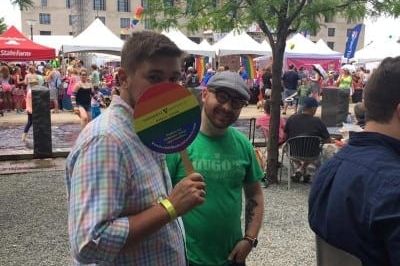Its main use once was to describe happiness. Then, it became synonymous with homosexuality. Now, a new media campaign from the Ad Council is focused on stopping the word 'gay' from being used as a casual derogative.
In schools across the nation, "That's so gay" has become the catchphrase of the moment used to describe anything that is seen as uncool on the teen scene. Students may find homework to be gay. Bad grades, a bad outfit - yes, they could be gay, too.
Traci Simms, a senior at Hume-Fogg Academic High School in Nashville and the vice president of the schools' Gay-Straight Alliance (GSA), said that youth culture has given "that's so gay" a negative connotation, when it was once considered non-offensive.
"I know most people who say ‘that's so gay’ don't mean to be offensive because I myself used to say it before I stopped and actually thought about what words could be used instead of gay, such as lame or stupid, and realized that gay isn't a synonym for these words at all," Simms said.
Even though its use may seem arbitrary and unintentionally demoralizing to homosexuals, the Ad Council and the Gay, Lesbian and Straight Education Network (GLSEN) have been hard at work to educate our nation's youth to think before they speak.
Using the star power of celebrities Hillary Duff and Wanda Sykes, the Ad Council and GLSEN have launched the "Think Before You Speak" campaign to encourage young people to stop using the negative catchphrase.
The campaign aims to raise awareness about the prevalence and consequences of anti-GLBT bias and behavior in America’s schools, according to a release from the Ad Council. The campaign also aims to reach adults, including school personnel and parents who's support of this message is crucial to the success of efforts to change behavior.
This is the first time the Ad Council has focused a multimedia PSA campaign on GLBT issues since its inception in 1942.
Joseph G. Kosciw, Research Director for GLSEN, said the ad campaign is a valuable resource for impacting young people today.
"Our research shows that use of expressions like ‘that's so gay’ are extremely prevalent in our nation's schools," Kosciw said. "Our research also shows that most LGBT students are bothered or distressed by hearing these expressions."
In the ad campaign, Hillary Duff and Wanda Sykes interrupt teens and turn their 'so gay' remarks against them. In a television commercial, Sykes flips the script on a boy in a pizza parlor saying, "Man, this pepper shaker is so 16-year-old boy with a cheesy mustache," then leaves the room to a voiceover saying "When you say gay, do you realize what you say? Knock it off."
The Hillary Duff ad is set at a fitting room where two girls are discussing a potential clothing purchase. One of the girls asks, "Do you like this top?" Her friend responds, "It’s so gay." Hillary Duff interrupts the girls to say, "You know, you really shouldn’t say that." Duff explains how it is insulting, resulting in embarrassment for the girl who made the homophobic remark.
Chelsia Stone, a senior and president of Hume-Fogg's GSA said the ad campaign is original and eye opening.
"I viewed the videos on the Web site and I thought they were really clever," Stone said. "This ad campaign is a wonderful idea because I don't think most people realize just how offensive saying something is gay can be. I think if widely seen by teens that they could definitely make a positive impact.
Kosciw said that schools like Hume-Fogg create more positive learning environments for gay and lesbian students.
"Our research, the 2007 National School Climate Survey, shows that GSAs, supportive educators, comprehensive safe school policies, and inclusive curriculum all have benefits for the school climate for LGBT students," Kosciw said. "Thus, schools or school districts that include these resources and supports will likely have more positive learning environments for LGBT students."
According to Simms, the Ad Council has gotten its point across.
"I think it's really important for young people to see the negative connotations behind this seemingly harmless phrase and understand why it's offensive and why they shouldn't say it, and I feel like these ads do a really good job of that," Simms said.
Visit www.thinkb4youspeak.com to access the radio announcements, television ads, and magazine ads that are part of the "Think Before You Speak" campaign .
